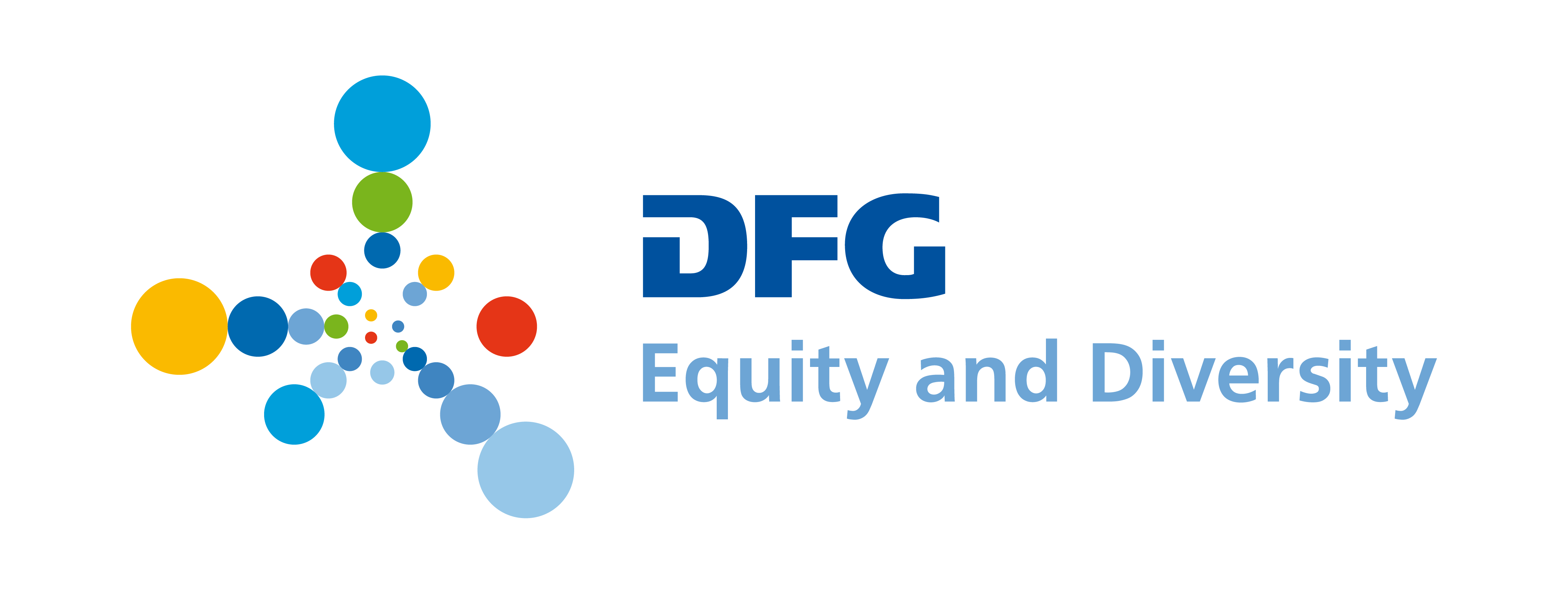Measures to Promote Diversity
Excellent research needs a diversity of perspectives and experience. This can be achieved by ensuring diversity among researchers, a diversity-friendly working environment and non-discriminatory participation. Diversity – also “multiplicity”, variety” or “heterogeneity”, which are used synonymously by the DFG – refers to the dimensions of difference between human beings and therefore researchers, too. In addition to sex and/or gender, the term includes other dimensions such as age, ethnic origin and nationality, sexual orientation, religion and ideology, disability or chronic/long-term illness as well as social origin (e.g. based on a person's economic situation, non-academic family background/family without experience of higher education/first generation academics, migration background). It also includes international researchers from different cultural backgrounds or whose experience is limited to a different research system and who are now based in Germany, so they are having to establish themselves in the German research system and find their bearings within it. Where one person combines more than one such dimension of difference (intersectionality), this should also be taken into account appropriately. When selecting dimensions of diversity and the appropriate measures, it is sensible and indeed necessary to ensure they suit the specific site or project. In this way, each project can set priorities based on its own profile.
The Standard Allowance for Equity and Diversity can also be used to finance measures dedicated to the structural promotion of diversity in science and the humanities so as to improve integration of the full range of societal potential to benefit research. Even in view of efforts to promote greater diversity in science and the humanities, high priority must continue to be attached to the pursuit of equity and parity among female researchers.
The objective of promoting diversity in science and the humanities must be documented for each specific measure.
The following measures can be financed for research staff, for example:
Career measures can be funded to promote diversity in science and the humanities (e.g. for first generation academics, researchers with a disability or a long-term illness, or for refugee researchers). In the case of new measures in particular, attention should be paid to quality (or quality assurance); if a trainer is involved, care must be taken to ensure that they possess expertise and sensitivity in the area of diversity. Career measures might include the following:
- mentoring, networking with role models, coaching,
- soft skills courses and workshops to broaden individual career perspectives,
- research-specific intercultural training,
- research-specific presentation and language courses, if such courses are not offered at the institution anyway (e.g. academic writing, leading research teams, teaching and committee work, academic self-administration).
- Counselling/support/discrimination counselling by external experts.
- Orientation/welcome events and networking events, introduction event to academia in Germany/the German research system, aimed at international researchers who are new to it.
In certain constellations, support/relief staff can be financed from the Standard Allowance for Equity and Diversity in the case of absences due to parental leave (mor(interner Link)) or long-term illness (mor(interner Link) or see www.dfg.de/diversity/personal_circumstance(interner Link)). Other compensation options are available beyond the Standard Allowance for Equity and Diversity, too. These are available both to overall project managers (or those in charge of individual projects) and the research staff employed on a project. See the above links for details.
Academic relief staff (student assistants/research assistants), e.g. for researchers with a disability or a long-term illness, in accordance with the framework conditions set out under “Compatibility” and “Funding of relief staff”. mor(interner Link)
- Travelling expenses for persons accompanying researchers with a degree of disability of 50% or more, unless the additional requirement is covered by the integration authority/employment agency responsible. Under German legislation, a person accompanying a disabled person can sometimes travel with them free of charge, but this does not apply to all means of transport and not always in the event of travel abroad. Additional costs may also be incurred for accommodation and catering for an accompanying person. Such costs can be covered by the Standard Allowance for Equity and Diversity or other DFG funding, providing German social welfare benefits are utilised first and the applicable travel expenses law allows people with disabilities to claim travel expenses for accompanying persons. Your travel expenses office can advise you on this matter. As a rule, costs incurred must be substantiated by receipts if these are available to the employee.
- Project-specific additional requirements for disability-friendly workplace fittings. Such requirements can only be met in exceptional cases, since the social welfare system (the employment agency, the integration authority, the health insurance company or the pension insurance) generally only covers benefits and additional requirements for equipping a workplace for a severely disabled person, the granting of a status equal to a severely disabled person, or fulfilling the needs of a person with a long-term illness; such benefits must be fully utilised as a matter of priority (supremacy of social welfare legislation). The DFG can only fund this kind of special disability-related, project-specific and research-specific requirement if a negative decision has been issued by the responsible social welfare authority and this authority does not provide funding. Please also check with your employer whether they offer individual benefits.
It is possible to obtain (pro rata) funding for an office assistant or a coordination office to organise equity measures for researchers within the network with the aim of meeting additional requirements incurred by equity measures applied within a DFG-funded project. The project-specific requirements must be plausibly documented. However, under no circumstances should the majority of the allowance be spent on this measure.
In the years 2020 – 2022, higher education institutions addressed diversity in connection with reporting on the DFG’s Research-Oriented Equality and Diversity Standards. The resulting “Summary and Recommendations” contain an overview of measures to promote diversity (section 6.2; in particular “individual”) which also serve as suggestions for the development of project-specific measures.
If you have any questions regarding the financial feasibility of measures, please contact:
